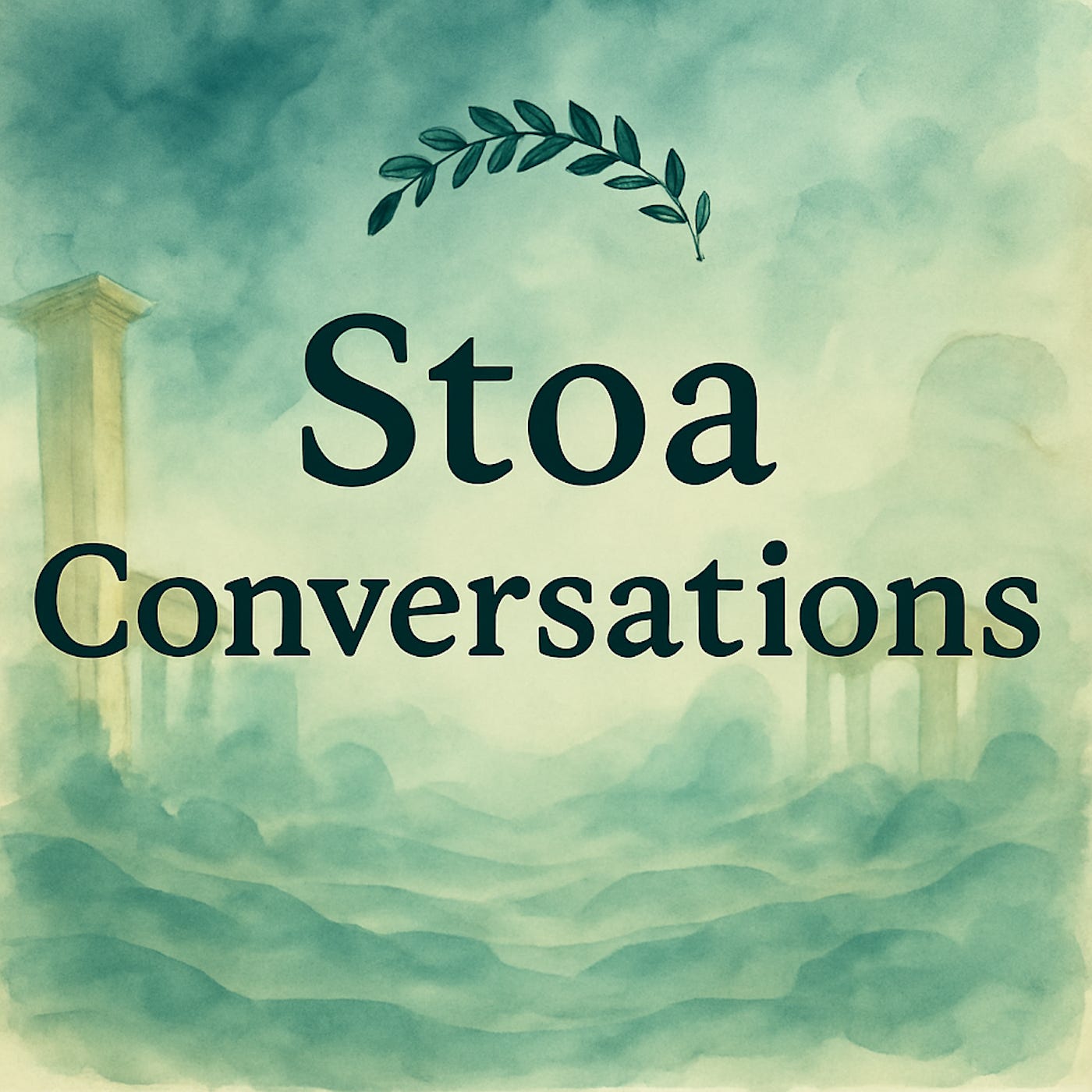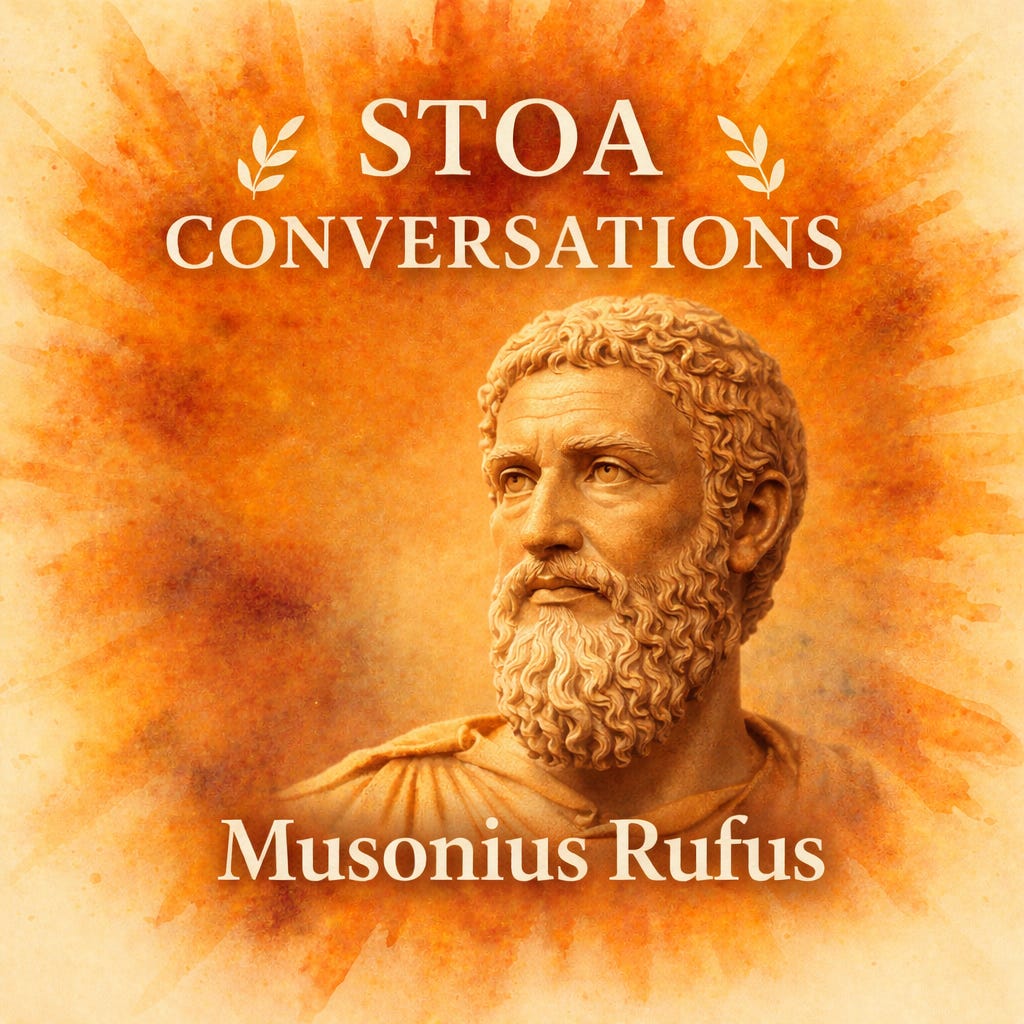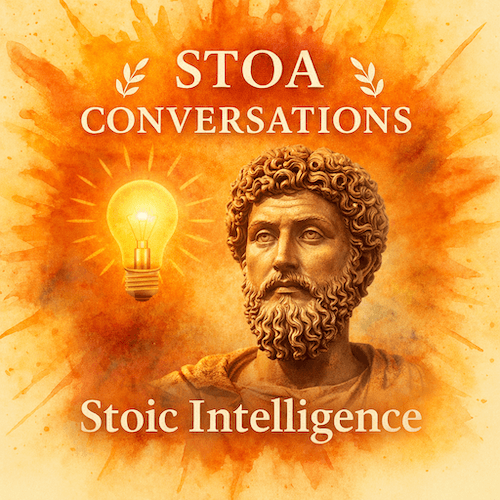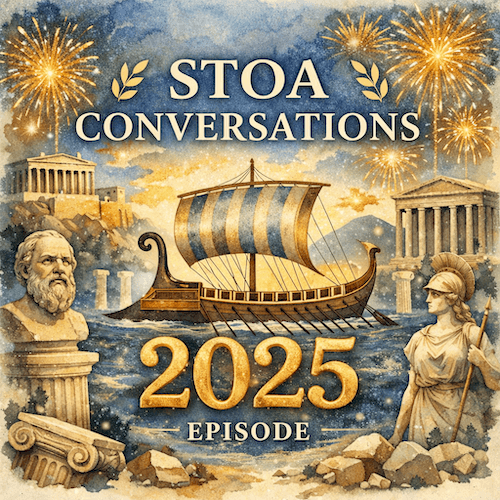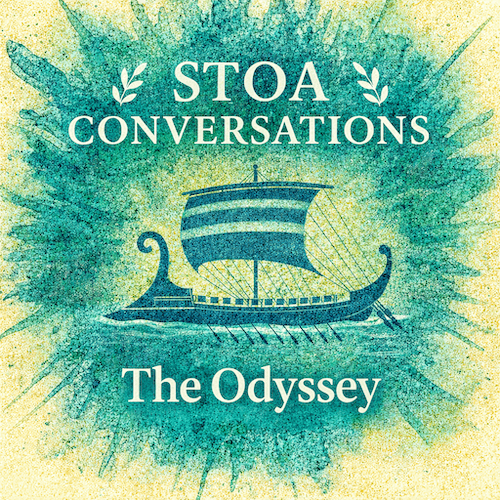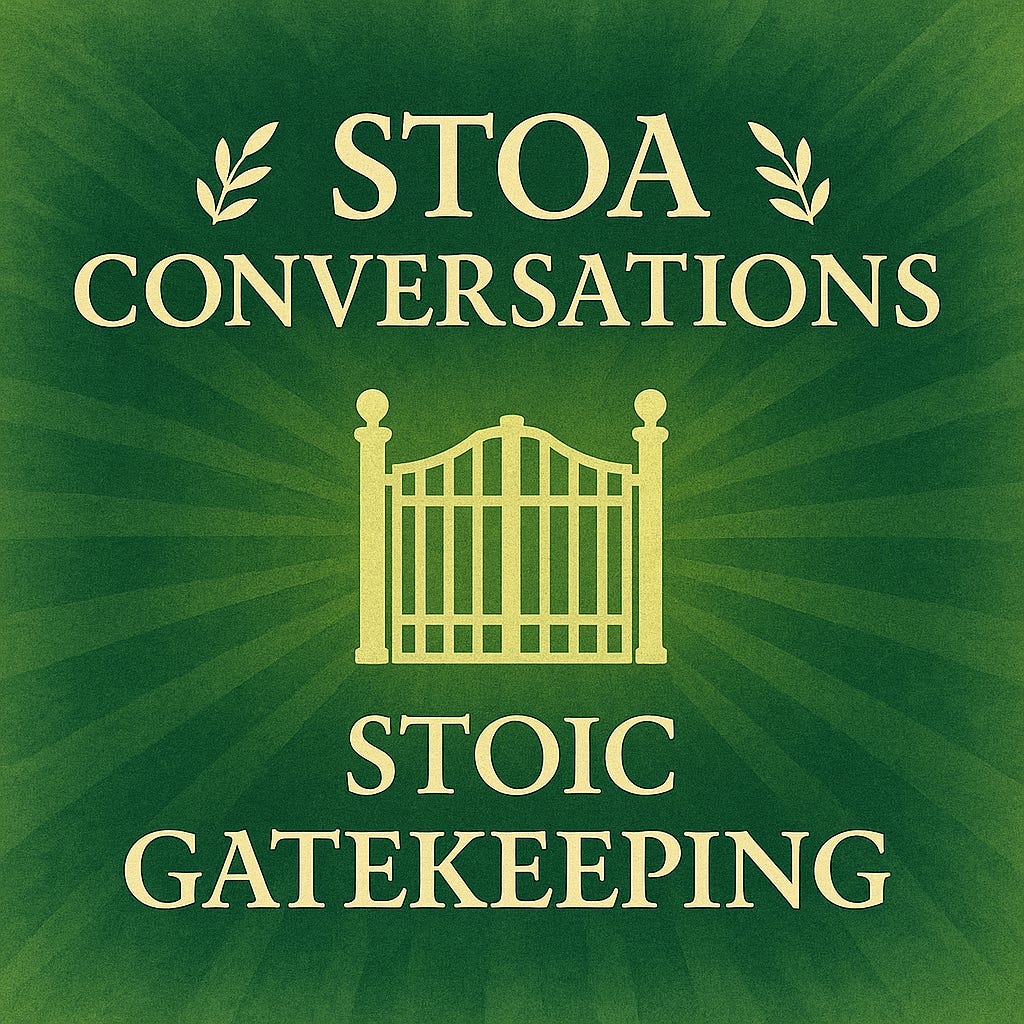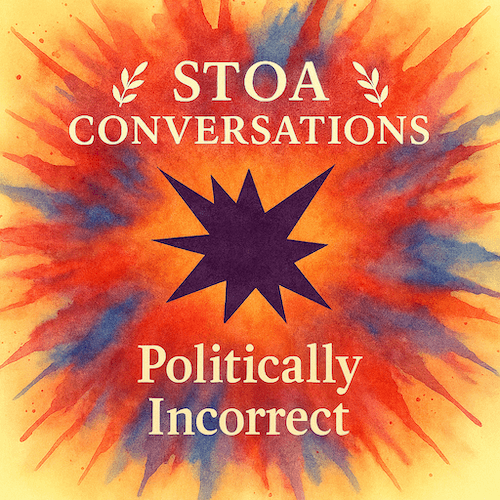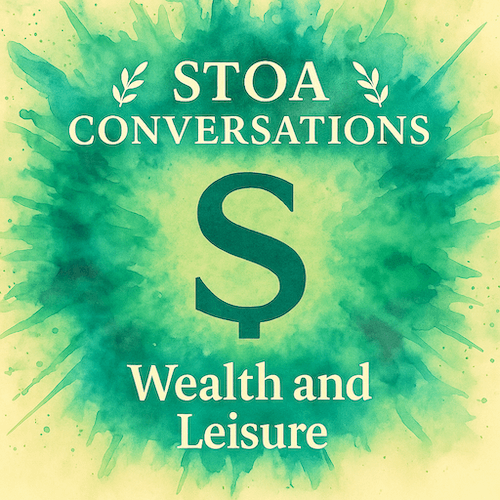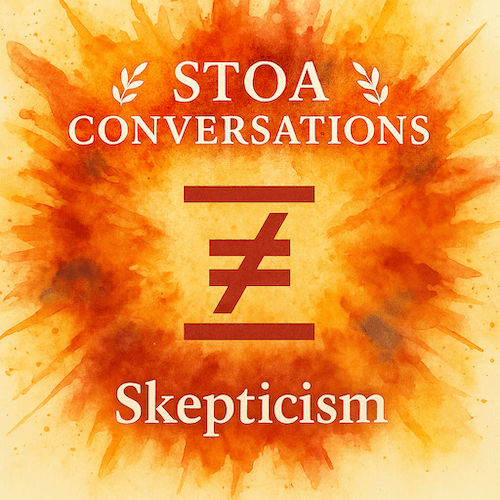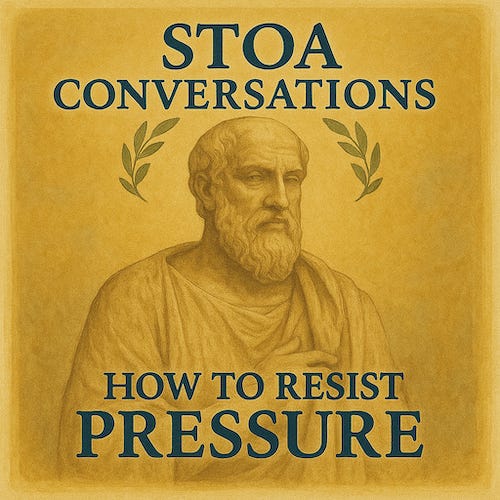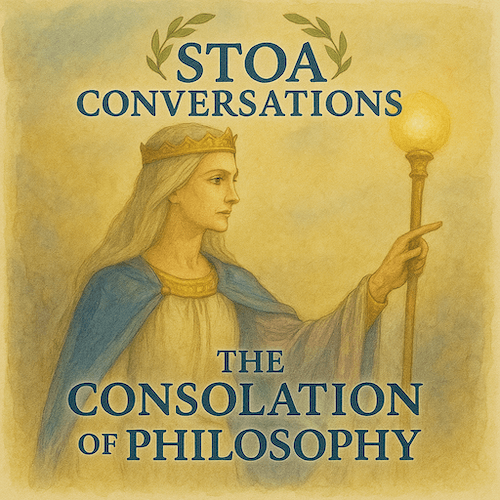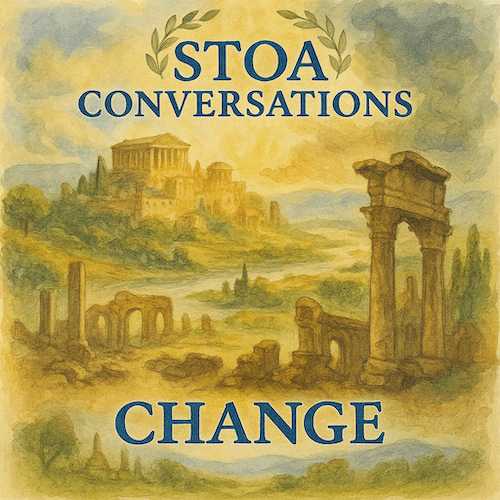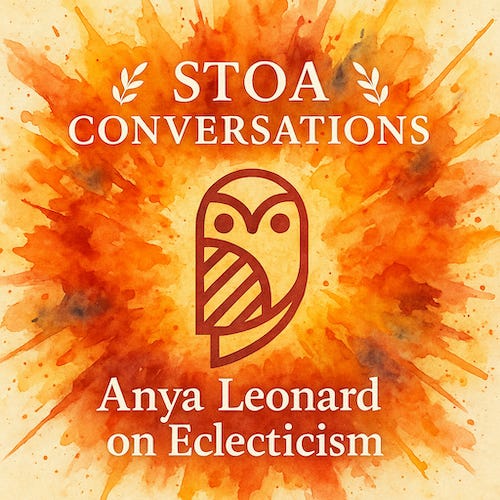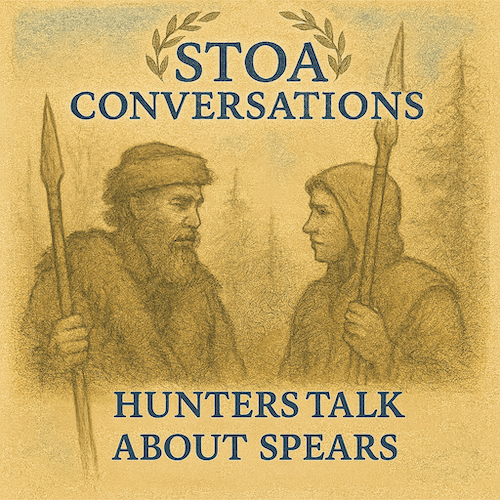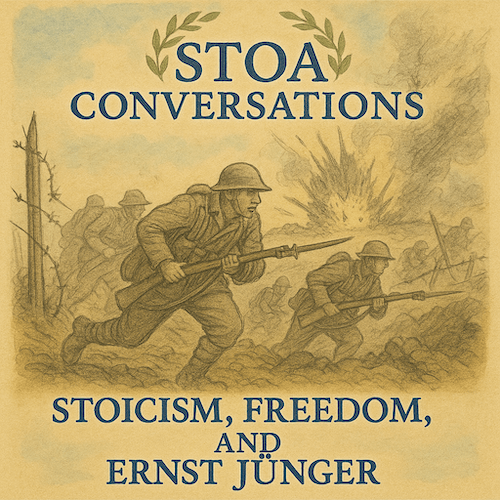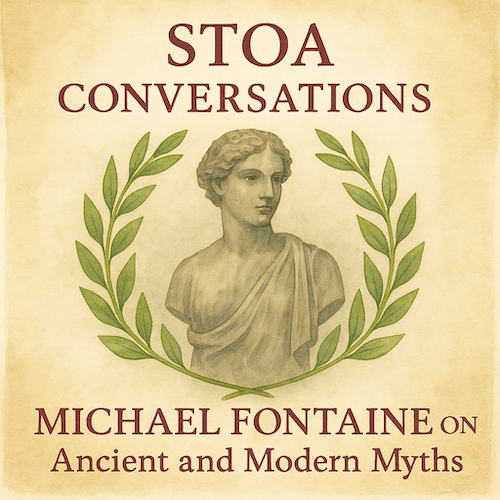Discover Stoa Conversations: Stoicism Applied
Stoa Conversations: Stoicism Applied

Stoa Conversations: Stoicism Applied
Author: Caleb
Subscribed: 83Played: 3,283Subscribe
Share
© Zeno Apps
Description
Caleb Ontiveros and Michael Tremblay discuss how to build resilience, develop virtue, and make sense of the world through Stoic philosophy.
One episode a week.
Get the Stoa app: www.stoameditation.com/pod [https://www.stoameditation.com/pod]
Get the Stoa Letter: www.stoaletter.com/subscribe [https://www.stoaletter.com/subscribe?utm_source=podcast_description]
www.stoaletter.com
One episode a week.
Get the Stoa app: www.stoameditation.com/pod [https://www.stoameditation.com/pod]
Get the Stoa Letter: www.stoaletter.com/subscribe [https://www.stoaletter.com/subscribe?utm_source=podcast_description]
www.stoaletter.com
223 Episodes
Reverse
What does a historian of Stoicism actually believe? Michael puts his money where his mouth is and lays out his personal philosophy of life from scratch.The result is something between Stoicism and Aristotle — keeping the Stoic emphasis on character and agency while smuggling in a little more common sense about the human condition.(00:00) Why articulate a personal philosophy?(04:00) The geometric method(05:00) The eudaimonistic framework(10:30) What kind of thing are we?(16:30) Degrees of happiness(22:00) Rejecting the Stoic binary(24:00) Unequal agency, genuine hardship, and obligations to others(32:00) The capabilities approach(37:30) The Stoic counterargument(44:30) SummaryDownload the Stoa app (it’s a free download): https://stoameditation.com/podIf you try the Stoa app and find it useful, but truly cannot afford it, email us and we’ll set you up with a free account.Listen to more episodes and learn more here: https://stoameditation.com/blog/stoa-conversations/Thanks to Michael Levy for graciously letting us use his music in the conversations:https://ancientlyre.com/ Get full access to The Stoa Letter at www.stoaletter.com/subscribe
Marcus Aurelius gives us a recipe for happiness in Meditations 2.16.Caleb breaks down the four ways we do the exact opposite: fighting reality, turning away from others, being ruled by pleasure and pain, and acting without purpose. Sometimes the best path to happiness isn’t chasing it directly, but removing what makes us miserable.(01:00) The Four Items: A Recipe for Happiness(03:50) First: Stop Fighting Reality(05:50) Second: Live Well With Others(09:30) Third: Don’t Be Ruled by Pleasure or Pain(11:00) Fourth: Act With Purpose(13:10) Closing Reading of Meditations 2.16Download the Stoa app (it’s a free download): https://stoameditation.com/podIf you try the Stoa app and find it useful, but truly cannot afford it, email us and we’ll set you up with a free account.Listen to more episodes and learn more here: https://stoameditation.com/blog/stoa-conversations/Thanks to Michael Levy for graciously letting us use his music in the conversations:https://ancientlyre.com/ Get full access to The Stoa Letter at www.stoaletter.com/subscribe
The teacher of Epictetus deserves more attention than he gets. Michael returns to Musonius and pulls out three themes: philosophical minimalism, a complicated egalitarianism, and surprisingly specific practical advice. Musonius distrusts overly academic philosophy. He wants simple arguments that appeal to common sense, then action. He argues women should study philosophy because they share the same capacity for reason—but still maintains distinct roles based on natural differences. And he gets remarkably concrete: raw food diets, growing out your hair, never pressing charges for assault, physical labor as the ideal job for a philosopher.Musonius doesn’t fit neatly into modern categories.Previous episode:(06:00) Philosophical minimalism: simple arguments, then practice(14:00) Why fewer strong arguments beat many weak ones(19:00) Complicated egalitarianism: equal as humans, different in roles(26:00) The middle ground between traditionalism and progressivism(31:00) Controversial practical advice begins(33:00) Physical labor as excellent work for philosophers(35:00) Marriage, children, and conservative sexual ethics(39:00) When to disobey your father(46:00) Diet, dress, and developing calluses(48:00) The case against luxury(50:00) Why you should grow out your hairDownload the Stoa app (it’s a free download): https://stoameditation.com/podIf you try the Stoa app and find it useful, but truly cannot afford it, email us and we’ll set you up with a free account.Listen to more episodes and learn more here: https://stoameditation.com/blog/stoa-conversations/Thanks to Michael Levy for graciously letting us use his music in the conversations:https://ancientlyre.com/ Get full access to The Stoa Letter at www.stoaletter.com/subscribe
What can a 17th-century samurai who won 60 duels to the death teach us about living well?Caleb and Michael explore the first book of Miyamoto Musashi’s classic work. The Ground Book lays a foundation that cuts across all pursuits. The conversation draws connections to Stoic ideas about indifference, adaptability, and the danger of becoming too attached to any particular school or method.(03:30) Musashi’s life (07:00) How mastering a craft teaches philosophy(10:00) The four ways of life: warrior, carpenter, farmer, merchant(19:00) Living first, reflecting later—inverting the academic model(26:00) Philosophy is learned through living, not just reading(30:00) The way: don’t get attached to any single weapon or style(38:00) Politics, martial arts, and the trap of picking teams(43:00) Indifference as flexibility and adaptability(50:00) Rhythm, timing, and setting the tempo of life(53:00) The ethical dimension: making your thinking free of evil(56:30) Musashi’s nine rules for practicing the wayDownload the Stoa app (it’s a free download): https://stoameditation.com/podIf you try the Stoa app and find it useful, but truly cannot afford it, email us and we’ll set you up with a free account.Listen to more episodes and learn more here: https://stoameditation.com/blog/stoa-conversations/Thanks to Michael Levy for graciously letting us use his music in the conversations:https://ancientlyre.com/ Get full access to The Stoa Letter at www.stoaletter.com/subscribe
What do the Stoics mean by intelligence? And how do you actually develop it?Caleb breaks down prudence into six trainable components from the ancient Stoic Arius Didymus: sound judgment, circumspection, shrewdness, sensibleness, soundness of aim, and ingenuity. Each gets a week. Each gets concrete exercises.This isn’t abstract philosophy. It’s a practical program for sharpening your thinking in whatever domain matters to you.(00:00) A Framework for Stoic Intelligence(04:50) Week 1: Sound Judgment — Knowing What to Do and How(12:50) Week 2: Circumspection — Keeping Your Perception Current(20:20) Week 3: Shrewdness — Acting Right Without Deliberation(28:40) Week 4: Sensibleness — Discerning Better from Worse(32:50) Week 5: Soundness of Aim — Hitting Your Target(37:10) Week 6: Ingenuity — Finding a Way Through(41:40) Closing ThoughtsDownload the Stoa app (it’s a free download): https://stoameditation.com/podIf you try the Stoa app and find it useful, but truly cannot afford it, email us and we’ll set you up with a free account.Listen to more episodes and learn more here: https://stoameditation.com/blog/stoa-conversations/Thanks to Michael Levy for graciously letting us use his music in the conversations: https://ancientlyre.com/ Get full access to The Stoa Letter at www.stoaletter.com/subscribe
Michael and Caleb look back on their favorite reads, conversations, and discoveries from the year.They discuss why Cicero’s On Ends deserves a spot on every Stoic’s reading list, what the New Testament and Stoicism have in common, and the power of keeping philosophical maxims close at hand. The conversation covers a Spanish Jesuit’s handbook on practical wisdom, Plato’s failed attempt to mentor a tyrant, and which Stoic exercises actually work in daily life. Finally, they wrap up with moves of the year.(01:00) Cicero’s On Ends: Why It’s the Perfect Second Book(08:10) Reading the New Testament as a Stoic(17:00) The Art of Worldly Wisdom by Baltasar Gracián(24:20) The Life of Plato: Philosophy Meets Tyranny(28:00) Stoic Maxims as Mental Magic(32:20) The 10 Stoic Exercises: What Actually Works(37:20) Movie Picks: Lord of the Rings and The Great BeautyDownload the Stoa app (it’s a free download): https://stoameditation.com/podIf you try the Stoa app and find it useful, but truly cannot afford it, email us and we’ll set you up with a free account.Listen to more episodes and learn more here: https://stoameditation.com/blog/stoa-conversations/Thanks to Michael Levy for graciously letting us use his music in the conversations:https://ancientlyre.com/ Get full access to The Stoa Letter at www.stoaletter.com/subscribe
The founders of Stoicism—Zeno, Cleanthes, Chrysippus—all wrote about Homer. Zeno’s longest work was called Homeric Problems. When we read the Odyssey, we’re reading what the Stoics read. We’re studying their curriculum.Following this tradition. Michael and Caleb examine what makes the Odyssey Stoic and what makes it decidedly not. Odysseus perseveres through failures, temptations, and divine opposition for twenty years. He just wants to go home. That single-minded endurance is deeply Stoic.But Homer’s hero also cries openly, grieves for years, and slaughters everyone who wronged him. He’s a brilliant bullshitter who tells elaborate lies even to gods. Is that Stoic?The tension between these traditions reveals something important about both.(0:00) Why the Stoics Studied Homer(6:30) Sparknotes(14:30) Stoic Theme: Perseverance Through Failure(22:40) Stoic Theme: Intelligence as Virtue(26:00) Stoic Theme: Cosmopolitanism and Being a Good Guest(35:00) Stoic Theme: Tact as Social Virtue(42:10) Non-Stoic Theme: The Emotional Hero(46:30) Non-Stoic Theme: Revenge and the Suitors(54:00) Non-Stoic Theme: The TricksterDownload the Stoa app (it’s a free download): https://stoameditation.com/podIf you try the Stoa app and find it useful, but truly cannot afford it, email us and we’ll set you up with a free account.Listen to more episodes and learn more here: https://stoameditation.com/blog/stoa-conversations/Thanks to Michael Levy for graciously letting us use his music in the conversations: https://ancientlyre.com/ Get full access to The Stoa Letter at www.stoaletter.com/subscribe
Who gets to call themselves a Stoic? Michael and Caleb tackle the issue of who is and isn’t a Stoic. Grounding their discussion in Michael’s recent article: (03:00) The Stoic alignment chart: theory purists to rebels(11:00) Benefits of gatekeeping: maintaining truth and standards(21:00) Epictetus as motivating gatekeeper(26:30) Risks: pedantry and missing the forest for trees(40:00) When gatekeeping becomes antisocial(46:30) Finding the balanceDownload the Stoa app (it’s a free download): https://stoameditation.com/podIf you try the Stoa app and find it useful, but truly cannot afford it, email us and we’ll set you up with a free account.Listen to more episodes and learn more here: https://stoameditation.com/blog/stoa-conversations/Thanks to Michael Levy for graciously letting us use his music in the conversations:https://ancientlyre.com/ Get full access to The Stoa Letter at www.stoaletter.com/subscribe
Some Stoic ideas cut against modern culture. Michael and Caleb examine seven truths that challenge how we think about politics, anger, success, and evil.The Stoics make claims most people won’t like hearing. Politics can’t ruin your happiness. Anger is always wrong. Being a victim doesn’t make you virtuous. You can’t choose all your obligations. Nearly everyone lives in luxury today. Some lives are objectively better than others. And no one truly wants to do evil.(00:00) Politics can’t make you unhappy.(09:00) Anger is never appropriate.(19:40) Neither victimhood nor victory are moral credentials.(26:10) You don’t choose all your roles.(34:20) Nearly everyone today lives in luxury.(39:10) Some lives are better than others.(43:10) No one intends to do evil.Download the Stoa app (it’s a free download): https://stoameditation.com/podIf you try the Stoa app and find it useful, but truly cannot afford it, email us and we’ll set you up with a free account.Listen to more episodes and learn more here: https://stoameditation.com/blog/stoa-conversations/Thanks to Michael Levy for graciously letting us use his music in the conversations: https://ancientlyre.com/ Get full access to The Stoa Letter at www.stoaletter.com/subscribe
Get full access to The Stoa Letter at www.stoaletter.com/subscribe
Caleb explores Seneca’s warning about wealth from Letter 17 and why material success may be a trap. The episode questions whether financial independence really delivers freedom or just creates new forms of dependence.Download the Stoa app (it’s a free download): https://stoameditation.com/podIf you try the Stoa app and find it useful, but truly cannot afford it, email us and we’ll set you up with a free account.Listen to more episodes and learn more here: https://stoameditation.com/blog/stoa-conversations/Thanks to Michael Levy for graciously letting us use his music in the conversations: https://ancientlyre.com/ Get full access to The Stoa Letter at www.stoaletter.com/subscribe
Michael and Caleb examine skeptical modes from Sextus Empiricus. These arguments show why you can’t trust your sense impressions. The Stoics and skeptics were rival schools. But they agreed on one thing: most people live under illusion. The skeptics said you can never overcome that. The Stoics said you can, but only if you’re extremely careful. Both agree you need to interrogate every impression.(3:20) Skeptics vs Stoics on impressions (9:00) Different animals see differently (15:30) Humans disagree with each other (20:20) Your senses contradict themselves (26:40) Your disposition changes everything (31:50) The ideal disposition for truth (35:10) What you’re next to matters (39:00) Rarity distorts value (39:53) Different cultures, different truths (43:10) Why philosophy starts with dissatisfaction (45:10) How far should skepticism go (49:40) Summary of nine skeptical modesDownload the Stoa app (it’s a free download): https://stoameditation.com/podIf you try the Stoa app and find it useful, but truly cannot afford it, email us and we’ll set you up with a free account.Listen to more episodes and learn more here: https://stoameditation.com/blog/stoa-conversations/Thanks to Michael Levy for graciously letting us use his music in the conversations: https://ancientlyre.com/ Get full access to The Stoa Letter at www.stoaletter.com/subscribe
Ever say yes when you meant no? Caleb and Michael explore Plutarch’s guide to resisting pressure and not being a pushover.Plutarch identifies the root problem as oversensitivity to shame. You care too much about violating social norms.The conversation covers when to respect social convention versus when to break it. They examine historical examples of caving gone wrong, from Creon and Medea to murdered dinner guests. The key insight is that caving makes things worse while standing firm with tact makes things better.(04:47) The Pushover: Oversensitivity to shame versus shamelessness(12:20) Mythical and historical examples of caving to pressure(22:20) Starting small: Rejecting social drinking and suffering fools(26:10) Giving honest feedback despite discomfort(32:10) Ten reflections on resisting pressure(41:30) Personal examples of caving and standing firm(43:40) Rules for not giving inDownload the Stoa app (it’s a free download): https://stoameditation.com/podIf you try the Stoa app and find it useful, but truly cannot afford it, email us and we’ll set you up with a free account.Listen to more episodes and learn more here: https://stoameditation.com/blog/stoa-conversations/Thanks to Michael Levy for graciously letting us use his music in the conversations: https://ancientlyre.com/ Get full access to The Stoa Letter at www.stoaletter.com/subscribe
When you’re in prison waiting to die, what can philosophy do for you? Michael and Caleb read Boethius’s Consolation of Philosophy - a book written by a Roman senator facing execution. It’s philosophy tested at the breaking point. The book works through arguments for why you shouldn’t be angry at fortune. Some are practical - don’t complain about losing externals when externals always change. Others cut deeper - fortune can’t touch what matters most, which is yourself. The interesting part is watching someone work through these arguments for real, not as theory.(03:20) Historical context and influences(09:00) Book structure and Lady Philosophy(13:50) Fortune hasn’t changed, it was always fickle(16:40) You chose to value externals, don’t complain when they shift(18:40) Fortune gave you everything, can’t be mad it took it back(21:30) Don’t overweight current misfortune(29:30) Fortune can’t affect what matters - yourself(34:40) External riches aren’t valuable anyway(38:00) External honors aren’t valuable anyway(42:10) Preview of Book Three - defining the good(45:30) Final thoughts on the bookDownload the Stoa app (it’s a free download): https://stoameditation.com/podIf you try the Stoa app and find it useful, but truly cannot afford it, email us and we’ll set you up with a free account.Listen to more episodes and learn more here: https://stoameditation.com/blog/stoa-conversations/Thanks to Michael Levy for graciously letting us use his music in the conversations: https://ancientlyre.com/ Get full access to The Stoa Letter at www.stoaletter.com/subscribe
Nothing stays the way you want it. Your job disappears. Relationships end. Everyone you know will die. The cities you live in will cease to exist. Michael and Caleb explore three Stoic strategies for accepting what you can’t control.(03:20) The Word “Nostalgia”(04:10) Strategy 1: Nothing Belongs to You (12:20) Strategy 2: Expand Your Time Horizon(19:20) Thinking in Life Stages (25:20) Strategy 3: Finding Agency in Change (29:30) Combining the Whole and the Part (35:30) Athletes Who Can’t Let Go (39:50) Just Do What Nature Demands Now (43:30) Summary and SynthesisDownload the Stoa app (it’s a free download): https://stoameditation.com/podIf you try the Stoa app and find it useful, but truly cannot afford it, email us and we’ll set you up with a free account.Listen to more episodes and learn more here: https://stoameditation.com/blog/stoa-conversations/Thanks to Michael Levy for graciously letting us use his music in the conversations: https://ancientlyre.com/ Get full access to The Stoa Letter at www.stoaletter.com/subscribe
Thank you for tuning into our live video! Join us for our next live video in the app.This episode is taken from our recent Substack Live episode where we covered reader questions. Follow us on Substack: https://www.stoaletter.com/ to catch the next one. Get full access to The Stoa Letter at www.stoaletter.com/subscribe
How much ancient philosophy should you steal? Caleb and Anya Leonard from Classical Wisdom explore the art of philosophical eclecticism, from Heraclitus’s cryptic fragments to philosophical rivals between Stoics and other schools.We start with Heraclitus, the riddling philosopher who wrote that you can’t step in the same river twice. His idea that strife creates harmony deeply influenced the Stoics. But he was deliberately obscure - even Socrates admitted he needed a “deep diver” to understand him. From there we discuss Skepticism and Epicureanism. (00:03:57) Flux and constant change(00:12:24) Providence vs chaos(00:15:21) Is strife justice(00:21:30) Fragments worth contemplating(00:22:41) Skepticism: How we know what we know(00:29:00) The Stoic-Skeptic debate(00:31:00) Suspending judgment in heated times(00:35:28) Epicureans and calculated pleasure(00:39:00) Simple pleasures vs hedonism(00:44:22) The value of eclecticismDownload the Stoa app (it’s a free download): https://stoameditation.com/podIf you try the Stoa app and find it useful, but truly cannot afford it, email us and we’ll set you up with a free account.Listen to more episodes and learn more here: https://stoameditation.com/blog/stoa-conversations/Thanks to Michael Levy for graciously letting us use his music in the conversations:https://ancientlyre.com/ Get full access to The Stoa Letter at www.stoaletter.com/subscribe
Philosophy talks about big ideas. The good life. Virtue. Happiness. But talking about aspirations isn’t enough. You need mechanisms—concrete practices that actually change behavior.Caleb examines why serious thinkers focus on mechanisms over aspirations. Discussions about mechanisms force action and generate information. Discussions about aspirations turn into complaints about the world.The Stoics were good at this. They didn’t just discuss anger. Seneca and Marcus Aurelius gave specific advice about becoming less angry. They broke virtue down into smaller parts: self-control becomes orderliness, propriety, modesty, self-mastery. Each breakdown gets more specific and decision-relevant.But you can’t ignore aspiration entirely. You need both the effective cause (what brings about change) and the final cause (where you’re going). Training and performance. The concrete and the universal. The Stoic sage sees and acts with both the whole and the part in mind.Philosophy is tricky because the problems are abstract. But that’s exactly why you need to speak at the right level of detail. Mechanisms for a purpose. Aspirations to set the target. Concrete practice to get there.Download the Stoa app (it’s a free download): https://stoameditation.com/podIf you try the Stoa app and find it useful, but truly cannot afford it, email us and we’ll set you up with a free account.Listen to more episodes and learn more here: https://stoameditation.com/blog/stoa-conversations/Thanks to Michael Levy for graciously letting us use his music in the conversations:https://ancientlyre.com/ Get full access to The Stoa Letter at www.stoaletter.com/subscribe
Sam Alaimo is a Navy SEAL who discovered Stoicism after leaving the military. He is a cofounder of Zero Eyes, an AI company stopping gun violence, and writes at whatthen.org. Caleb and Sam discuss how affluent societies need philosophy, whether virtue alone makes life good, and why Ernst Jünger remains one of history’s most fascinating thinkers. The conversation moves from ancient philosophy to World War I trenches to the risks of letting AI do our thinking.(00:00) Sam’s background and writing journey (04:00) How Stoicism helped after military service (06:20) Why affluent societies invented Stoicism (08:00) AI as a war on human reason (10:30) Epictetus: the most extreme example (15:00) Marcus Aurelius: emperor and philosopher (20:10) Why Epictetus avoided the word “virtue” (24:10) Stoicism as energetic, not passive (26:20) Where the Stoics got it wrong (30:20) Existentialism and Stoicism on freedom (34:20) Ernst Jünger: war hero and philosopher (38:20) Storm of Steel and phenomenology of war (44:30) Philosophy divorced from reality (47:20) Jünger’s fiction and diariesDownload the Stoa app (it’s a free download): https://stoameditation.com/podIf you try the Stoa app and find it useful, but truly cannot afford it, email us and we’ll set you up with a free account.Listen to more episodes and learn more here: https://stoameditation.com/blog/stoa-conversations/Thanks to Michael Levy for graciously letting us use his music in the conversations:https://ancientlyre.com/ Get full access to The Stoa Letter at www.stoaletter.com/subscribe
Have we traded ancient wisdom for modern myths?In this episode, Caleb speaks with Cornell classics professor Michael Fontaine.Fontaine argues that psychiatry and mythology both offer competing stories about human suffering. The ancients had three models: medical treatment, spiritual purification, or taking responsibility for your choices. Today we’ve mostly picked door number one and forgotten the rest.How to Have Willpower(9:20) A Forgotten Distinction: Reasons vs Causes(19:30) Freedom and Responsibility(31:20) Death, Souls, and Scientific Myths(49:30) Ancient Philosophy for Secular StudentsDownload the Stoa app (it’s a free download): https://stoameditation.com/podIf you try the Stoa app and find it useful, but truly cannot afford it, email us and we’ll set you up with a free account.Listen to more episodes and learn more here: https://stoameditation.com/blog/stoa-conversations/Thanks to Michael Levy for graciously letting us use his music in the conversations: https://ancientlyre.com/ Get full access to The Stoa Letter at www.stoaletter.com/subscribe


